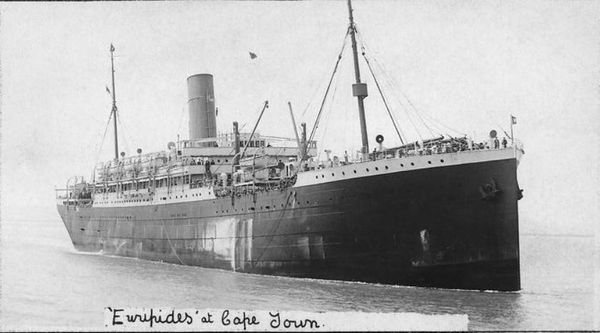Difference between revisions of "HMAT A14 Euripides"
From Our Contribution
| Line 38: | Line 38: | ||
==Remarks== | ==Remarks== | ||
| − | Built for G Thompson & Co Ltd, Glasgow, she was on her maiden voyage to Brisbane when war broke out. Requisitioned two days after her arrival by the Commonwealth, whose control ended 2 Jun 1917. | + | Built for G Thompson & Co Ltd, Glasgow, she was on her maiden voyage to Brisbane when war broke out. Requisitioned two days after her arrival by the Commonwealth, whose control ended 2 Jun 1917, with the Euripides being taken over by te British Admiralty. |
A member of the first convoy from Albany, she completed seven voyages from Australia with troops. In 1919 she was used to repatriate Australian troops and during the period 1914 - 1919 she carried 38,439 troops to or from the war. | A member of the first convoy from Albany, she completed seven voyages from Australia with troops. In 1919 she was used to repatriate Australian troops and during the period 1914 - 1919 she carried 38,439 troops to or from the war. | ||
Revision as of 17:15, 7 December 2017
 | |
| History | |
|---|---|
| Name | HMAT A14 Euripides |
| Builder/Built | 1914 Harland & Wolff, Belfast |
| Type | Passenger / cargo steamship (triple screw) |
| Displacement | 14,947 tons |
| Speed | 13 knots |
Contents
- 1 Remarks
- 2 Staff
- 3 Soldiers carried
- 4 Sydney to Alexandra 20 October - 3 December 1914
- 5 Plymouth to Fremantle 24 June - 3 August 1916
- 6 Port Suez to Melbourne 22 January - 21 February 1917
- 7 Plymouth to Australia 22 July 1917 - 11 September 1917
- 8 Sydney to New York 1 May - 14 June 1918
- 9 Portland to Fremantle 3 March - 10 April 1919
Remarks
Built for G Thompson & Co Ltd, Glasgow, she was on her maiden voyage to Brisbane when war broke out. Requisitioned two days after her arrival by the Commonwealth, whose control ended 2 Jun 1917, with the Euripides being taken over by te British Admiralty.
A member of the first convoy from Albany, she completed seven voyages from Australia with troops. In 1919 she was used to repatriate Australian troops and during the period 1914 - 1919 she carried 38,439 troops to or from the war.
Post war she was overhauled and resumed the Aberdeen Line's London - Australia route, before changing hands several times between wars. In 1932 she was renamed Akaroa.
During WW2 she was again used as a troopship before another transformation in 1945 back to civilian use before being sent to shipbreakers in Antwerp in May 1954.
Staff
- Euphemia Weir Huntley Scott served as nurse to patients returning to Australia on Oct 1915 voyage.
Soldiers carried
Sydney to Alexandra 20 October - 3 December 1914
Plymouth to Fremantle 24 June - 3 August 1916
Port Suez to Melbourne 22 January - 21 February 1917
- Sidney Tugby
- William Henry Shade disembarked in Fremantle